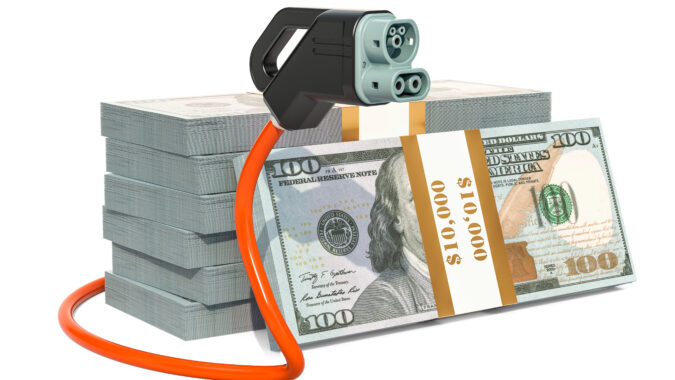The Murphy administration’s efforts to require that all new car sales be electric vehicles by 2035 will cost taxpayers $70.5 billion, primarily from state rebates on EV purchases and lost sales tax revenue and gas tax revenue, since EV owners pay neither tax, new research says.
A whitepaper released Monday by the advocacy group Affordable Energy for New Jersey, of which NJBIA is a member, also notes the costs associated with taxpayer-subsidized public EV charging infrastructure, subsidies for home and workplace charging stations, and the cost to ratepayers to upgrade electric utility local distribution systems to handle the increased loads caused by home and commercial charging.
Additionally, lost toll revenue will need to be made up by other drivers because EVs owners are given a 10% discount on tolls. Upgrading NJ Transit’s fleet to electric buses is another cost.
In all, the direct costs of the mandate would be about $5 billion by 2025 and $70.5 billion by 2035 – over $7,600 for each of the state’s 9.2 million residents and $35,000 for each of the mandated two million EVs, the report concludes.
“This white paper debunks the flawed thinking that Electric Vehicles are a ‘big win’ for New Jersey consumers and businesses, which will save them billions of dollars,” said Ron Morano, executive director of Affordable Energy For New Jersey.
“That $70 billion will come in the form of new taxes that will be borne primarily by low-income residents and small businesses, who can least afford them,” he said.
Prepared by Dr. Jonathan A. Lesser, president of Continental Economics, Inc., the paper “New Jersey’s Electric Vehicle Mandate: A High-Cost Boondoggle that Will Wreck the Economy, Harm the Poor, and Have No Impact on Climate and Have No Impact on Climate,” examined the impact the state law that requires a total of 330,000 electric vehicles (EVs) to be on New Jersey roads by 2025 and 2 million by 2035.
The lion’s share of the cost – $58 billion by 2035, would be from the sales tax exemption on EV purchases. That figure is based on the current sales tax rate of 6.625% and assumes the $55,000 average cost of all EVs purchased in the state increases at an assumed rate of inflation of 2% per year. That lost revenue “surely will be recouped by the state by raising other taxes and fees, most of which will be paid by non-EV owners,” the report states.

